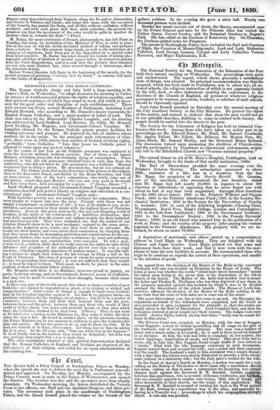DEMONSTRATION OF THE ROMAN CATHOLICS.
• The Roman Catholic clergy and laity held a large meeting in St. James's Hall, on Wednesday, "to adopt measures for securing to Catho- lic inmates of workhouses and prisons the rights of religious equality, and that spiritual assistance of which they stand in need, and which is neces- sary for the good order and discipline of such establishments." There were present ten Peers, several Members of Parliament, including Lord Edward Howard, who according to Mr. Disraeli's theory represents the English Roman Catholics ; and a great number of ladies of rank. The chair was taken by the Honourable Charles Langdale, and the meeting was addressed by Lord Stafford, Lord Herries, Dr. Gillis, Mr. Memell, Lord Fielding, Mr. Maguire, and Lieutenant-Colonel Vaughan. Mr. Langdale claimed for the Roman Catholic priests greater facilities for visiting prisoners and paupers. He deplored the fate of children whose mothers die in the union. In the principal male reformatory of Glas• gow, there were in 1858, ninety-four natives of Ireland, of whom eighty, " probably," were Catholics. " Into that house no Catholic priest is allowed to enter upon any pretext whatever." In the course of last year an old Catholic pensioner was employed to train the boys in military walking exercise. One of them, a lad named Mooney, seventeen years old, was evidently dying of consumption. When confined to bed, the old pensioner obtained leave to visit him from the authorities, who did not know he (the pensioner) was a Catholic. Mooney requested him to bring a priest. He procured one, but he was refused ad- mission. The bishop wrote first to the Governor of the prison on the subject, then to the Executive Board, and finally to the Home Secretary, but with no more success. One of the boy's companions, who lately came out of the prison, stated that poor Mooney, who was not over good or he would not have been there, died screaming for a priest. (" Shame, Shame !") Lord Stafford proposed and Lieutenant-Colonel Vaugh;n seconded a resolution that full and perfect liberty on religion and education is a con- stitutional right. Lieutenant-Colonel Vaughan said— With Catholics poverty was not simply a subject for compassion. They were taught to respect and love the poor. Poverty with them was not simply a misfortune—a condition of life ; it was, if :he might so say, an in- stitution, and associated in their minds with the highest types of Christian excellence. Even in this great metropolis, this gay and flaunting world of London, in the midst of the refinements of a fastidious civilization, they were daily reminded that the purest and loftiest models for their imitation had practised poverty. They were reminded, too, that the Author of our religion Himself chose to be a poor mechanic, exposed to the same priva- tions as the homeless poor, whose case they were there to advocate. He would stir their hearts, and even alarm their consciences, by charging them that they never desist in demanding protection and consideration for the un- fortunate children who were driven into workhouses by want and suffering, until such protection and consideration were conceded. To tell a poor, cowed object, a forlorn child, that he could exercise his rights in spite of the influence and prejudice of the authorities placed over him was a cru_gl mockery, evincing complete ignorance of human nature. It was like tell ing a pauper he might find redress for his wrongs by filing a bill in the Court of Chancery. The class of persons of whom he spoke required every facility for practising their religion ; it was not sufficient that they sought it ; it must be taken to them. They must, in short, be placed in the same position as their Protestant fellow subjects.
Mr. Maguire said there is no Minister, however proud or jaunty, no party, however strong, and no Government, however averse to Catholics, that may not be made to succumb to their strength, because their cause is a just one.
Is there any part of the world except this where so large a number of poor Catholics are exposed to degradation so great, or to tyranny so wicked and comprehensive ? Such a state of things is enough to band every Catholic man in the kingdom together against it. Let this be no gigantic sham—no platform exhibition for the trotting out of orators ; but let it be a matter of conscience between them and their God, between them and the poor, between them and the priest, between them and those who would if they could or if they dared, bow down with grateful hearts at that altar which they, the Catholics, claimed to be their own. (Cheers.) They do not want to be tided over a session as the Ministers do, they want to strike the blow when the iron is hot. He heard in another place, on the previous evening, the Prime Minister say he was anxious to continue to give the Catholics fair play and justice. He has the power to do so, and let them try him. If he does not concede it to them, others must. Let them lose no time in asking for it at once. As the old song said, "Take me while I'm in the humour." If Lord Derby was in the humour they would be delighted ; but if he was not, perhaps they might find a way to make him. The other resolutions adopted at this spirited demonstration declared that the Roman Catholics in England and Scotland are deprived of the full exercise of their religion, and called for an equal administration of the existing law.


























 Previous page
Previous page